
12 Awesome Books Translated from Arabic
Modern Standard Arabic is an official language in more than 25 countries — the third most after English and French. It’s also the liturgical language of the religion of Islam — the Q’uran and the Hadiths were written in Classical Arabic. Due to cultural and political influence over the centuries, it has had a tremendous impact on vocabulary and languages including Spanish, Greek, Turkish, Bosnian, and many more. Taking all varieties together, Arabic is the fifth most spoken language in the world, with 422 million speakers.
And so a wealth of modern literature is written in Arabic. The books below hail from Egypt, Palestine, Oman, Syria, Saudi Arabia, Kuwait, Lebanon, and more. Authors write of women’s sexual and romantic lives, of violence and state oppression, of leaving and returning, of betrayal. They write realism, surrealism, and sci-fi satire, giving us emotional stories that are honest, bold, and engrossing.
People slide through the slippery edges of time. Citizens stand in a never-ending line, waiting for the government office to open so they can get permits that will allow them to get back a job or have life-saving surgery. Women try to find a space for themselves within their marriages. A woman sets out to find proof of a moment of violence buried in history. These 12 books in translation from Arabic will make you think, hurt your heart, and encourage you to read more translated literature.
Please note that while I took great care to list content warnings where I could, things can fall through the cracks. Please do additional research on the recommended titles if needed.
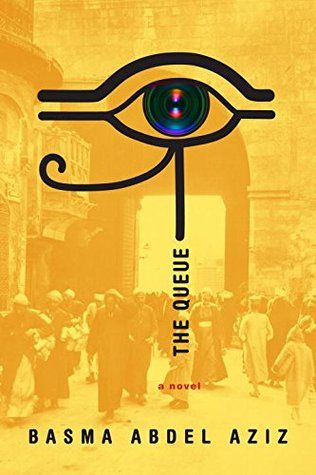
The Queue by Basma Abdel Aziz, translated by Elisabeth Jaquette
In this modern classic of a political satire, a surveillance state built of twisting bureaucracy paralyzes an entire society. A man named Yehya waits in a never-ending queue for a government office that will someday, possibly open, in order to get a permit to get a bullet removed from his gut. Aziz’s novel expertly shows the tranquilizing impact of a system of “order,” of how the quiet banality of evil that allows systems of repression slowly encourages not only the taking away of rights, but also turns people in society against one another.
Content warnings for sexual harassment, violence, gaslighting, psychological torture.
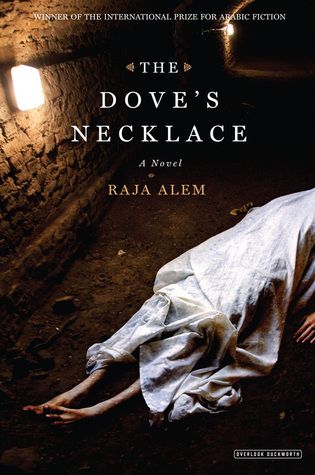
The Dove’s Necklace by Raja Alem, translated by Katharine Halls and Adam Talib
Raja Alem was the first woman to win the International Prize for Arabic Fiction for this twisty mystery. It all begins when a naked female body is discovered in the Lane of Many Heads in Mecca, and no one claims it. Detective Nasser digs into the emails of a local woman, thinking the body might be her, and discovers whirls of crime, intrigue, and love — all as we hear from the woman’s neighbor, a man who would really, really like the rapidly changing world around them to just slow down.
Content warnings for misogyny, violence, child death.
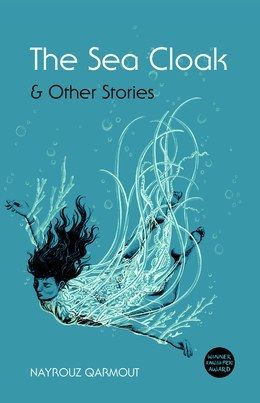
The Sea Cloak and Other Stories by Nayrouz Qarmout, translated by Perween Richards with Charis Olszok
In this compact collection of rich short stories, Qarmout writes of how generational trauma, violence, and displacement have become woven into everyday life in Palestine. In these tales, both harsh moments of extremist violence and also quieter violences take place — betrayals, fear, poverty. In Qarmout’s stories, mothers strive for better for their daughters — people leave, and return — a young girl swims in the sea longing for a freedom that’s always going to be a little out of reach.
Content warnings for rape, Islamophobia, violence, terrorism.
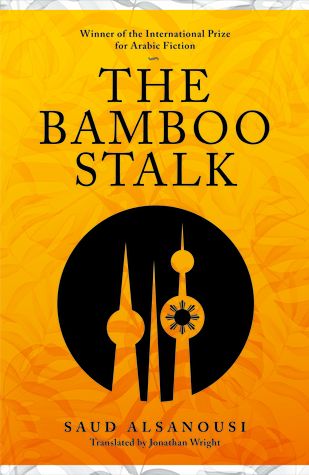
The Bamboo Stalk by Saud Alsanousi, translated by Jonathan Wright
A young woman named Josephine comes to Kuwait from the Philippines. She comes to work as a maid, but falls for the son of the family she’s working for, Rashid, and when she gets pregnant, Rashid’s mother promptly gets her fired and sent back to her country. This story then follows her son, José, as he comes of age with two identities whirling around within him, wondering about the Kuwait side of his family. It’s a rich story that highlights issues of class, prejudice, and what it means to belong.
Content warnings for suicidal ideation, toxic relationship, xenophobia, parental death, incest, Islamophobia.

Palestine +100: Stories from a Century after the Nakba edited by Basma Ghalayini
What does it mean to imagine a future when everyday life is already dystopian — and you can’t visit your own past? This short story collection features a dozen stories — six of them in translation — by Palestinian authors who imagine the future through their lenses of generational trauma, memory, and science fiction. This collection is one of my favorite reads of the year. Majd Kayyal’s “N,” translated by Thoraya El-Rayyes, looks at what a split universe could look like, shows the inequalities and pains that persist, shows the tricks and lies that continue to cause damage, while in “The Association” by Samir El-Youssef, translated by Raph Cormack, a journalist investigates the murder of a historian and uncovers a group of rebels trying to preserve the memory of the war that a treaty pledged to stamp out.
Content warnings for violence/gore, suicide, Islamophobia/xenophobia, forced relocation, use of the g-slur.

Minor Detail by Adania Shibli, translated by Elisabeth Jaquette
In the summer of 1949, a year after the massive displacement of more than 700,000 Palestinians, Israeli soldiers murder Bedouin in the desert and bring a surviving girl home. Years later, a young woman in Ramallah wants to find out more about this buried act of violence. By zooming in on the tiniest details, Shibli shows in this short novel the horror of the everyday, the desensitization of violence, and the way trauma absolutely haunts the present and how government oppression makes everything a fog of confusion and anxiety.
Content warnings for sexual assault and graphic rape, body horror, violence, torture, Islamophobia.
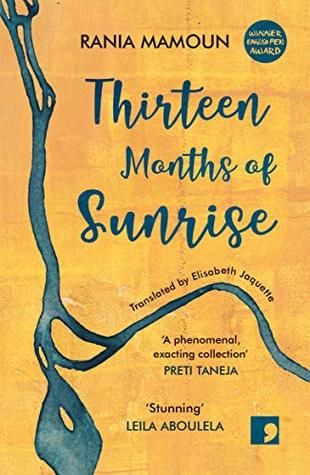
Thirteen Months of Sunrise by Rania Mamoun, tr. Elisabeth Jaquette
At just 72 pages, you can read this short story collection with your morning cup of coffee. The book offers glimpses of people’s lives in Khartoum, Sudan, dipping into small passing moments, from a woman on a bus deep in her thoughts to a writer and her muse to a widow trying to get her son medical treatment. Ramoun’s stories are melancholic and lingering, touching on grief, struggle, abuse, fear, cultural difference, and more.
Content warnings for chronic illness, mental illness, parental death, animal death, physical abuse.

The Proof of the Honey by Salwa al Neimi, translated by Carol Perkins
In this novel, the unnamed narrator luxuriates and explores her unabashed love for all things sex, for the open discussion and shared stories of it, for the physical pleasure of it, for its long, storied history. She discusses what makes it taboo and wants to break it all open, destroy the dissimulation and shame that ask women to edge around the subject of sex, the bias of Western audiences in believing that Islam societies are somehow sexless. The narrator explores her own long relationship with a man she calls the Thinker, and tries to unpack what she thinks about love. While a bit binary in its summary of gender, this novel is still a poetic, erotic exploration of pleasure and why we should speak about it more freely.
Content warnings for misogyny, homophobia, descriptions of sexual harassment, assault, rape.

Slipping by Mohamed Kheir, translated by Robin Moger
Journalist Seif follows his tour guide, Bahr, on a tour of the liminal spaces of Egypt — from ghost towns to spirits to unsolved mysteries. Meanwhile, Seif is struggling under the weight of his own ghosts, remembering nights of suppressed protest and his once-girlfriend Alya. Him and Bahr explore a surreal world fractured by history and oppression. The reader will have to have some faith and go along for the ride — Kheir takes us on a wild tour of stories and anecdotes that will slowly all come together to make one wild story.
Content warnings for grief, violence, torture, sexual assault, trauma, suicidal ideation.
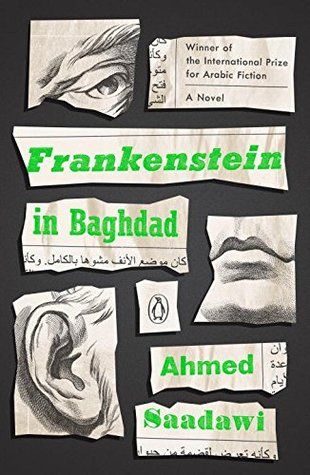
Frankenstein in Baghdad by Ahmed Saadawi, translated by Jonathan Wright
A scavenger in an occupied, surreal Baghdad collects a bunch of human body parts and sews them together, wanting to force the government to recognize it as a corpse, which would allow the limbs to have a proper burial. But then the stitched-together corpse disappears and Hadi begins hearing of violence around the city — of murders committed by a man who can’t be killed. This book made up of short chapters is unsettling with a satirical edge.
Content warnings for death, violence, torture, police brutality, substance abuse, sexual assault.
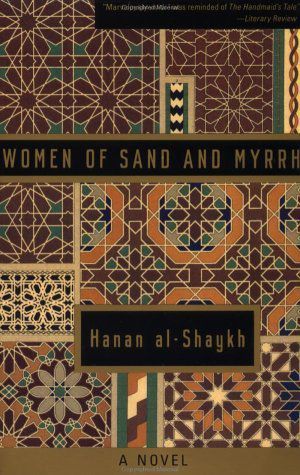
Women of Sand and Myrrh by Hanan Al-Shaykh, translated by Catherine Cobham
Four women struggle and drown in the lives offered to them in an unnamed desert state ruled by a rigid patriarchal system, unable to work or be productive in satisfying ways, losing themselves in travel or pleasure, or dedicating themselves to an uphill climb within their narrow boundaries.
Please note that this book was substantially edited in its translation into English, which involved swapping around the order of the characters’ sections. This is a significant issue, but it’s still a great book about messy, complex women trying to live their lives in this oppressive world. So I recommend reading it, and just immediately following it with a read of Michelle Hartman’s “Gender, Genre, and the (Missing) Gazelle: Arab Women Writers and the Politics of Translation.”
Content warnings for sexual harassment & assault, misogyny, homophobia, xenophobia, emotional abuse, manipulative relationship, exotification, ableism.
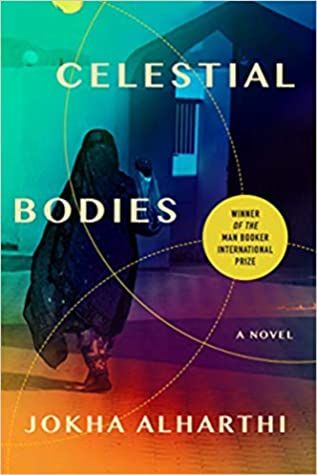
Celestial Bodies by Jokha Alharthi, translated by Marilyn Booth
In the village of al-Awafi in Oman, there are three sisters: Mayya, married first, finding refuge from her anxiety in sleep; Asma, literary and learned; and Khawla, preserving her beauty for the man she loves, for when he someday comes back from Canada for her. From these three girls extends a web of stories, including that of Mayya’s husband Abdallah and his tortured family and the people who were formally enslaved by them. Issues of class, misogyny, love, and heartbreak fracture and bind these stories together, and while it can be a bit twisty to follow early on, by the final page, the interlocking stories have come together for a great payoff.
Content warnings for misogyny, sexual assault, domestic abuse, child abuse, homophobia, ableism, classism.
Want more books in translation content? I have lists for you of books in translation from Catalonia, Argentina, France, Mexico, Central Africa, Japan, Southeastern Europe, Brazil, Ukraine, Sweden, China, West Africa, Germany, and Chile. If you have recommendations or requests for future lists of books in translation, or if you want me to know about a book I missed, please let me know on Twitter!
















